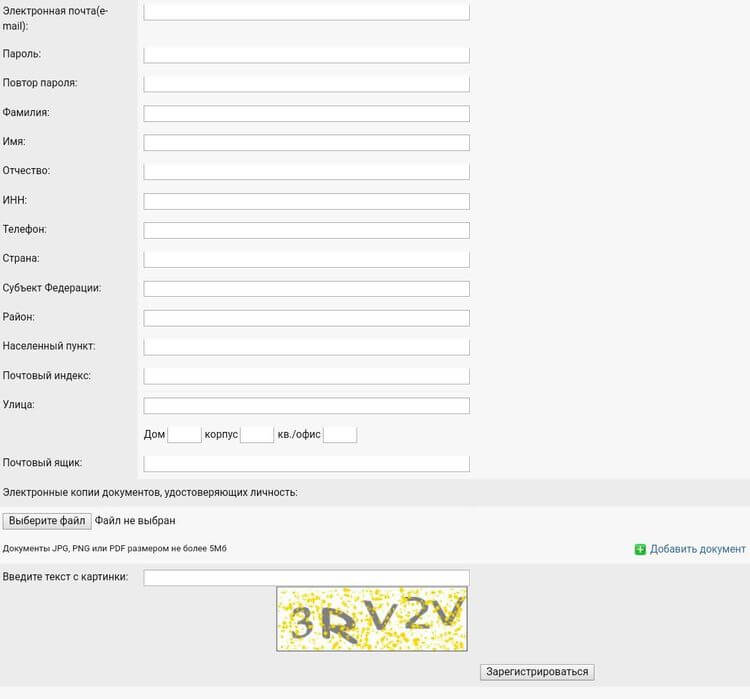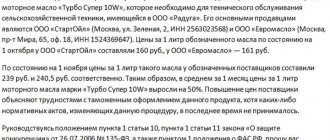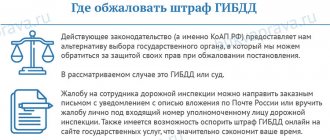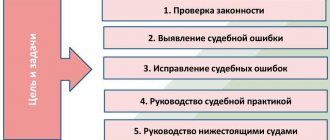The Constitutional Court of the Russian Federation (CC) is an independent body of the highest judicial power that exercises control and judicial proceedings regarding the compliance of legislative and regulatory acts with the fundamental law of the state. According to paragraph 4 of Art. 125 of the Constitution of the Russian Federation, the list of powers of the Constitutional Court includes consideration of complaints from citizens about violations of their constitutional rights and freedoms by legislative norms. Those. if the subject of disagreement is the provisions of a legal act on the basis of which an unfair judicial decision was made, the citizen has every right to send a corresponding application to the Constitutional Court.
Requirements for a complaint
In order for an appeal to be accepted for consideration by the Constitutional Court of the Russian Federation, it is necessary to comply with the requirements of the law:
- Strict compliance with the competence of the Constitutional Court.
- Reasonability of the presented requirements - the applicant must prove that the contested legislative acts actually contradict the Constitution of the Russian Federation.
- Submission by an eligible person - an application will not be accepted from a person whose rights and interests are not directly affected. In this case, the infringement of rights and freedoms will need to be proven using a copy of the court decision (How to file a complaint with the court) or another document confirming the application of the conflicting law when making a court decision
- Openness of data about the applicant and other persons and circumstances significant when considering the complaint.
- Availability of necessary documents.
- Compliance with appeal deadlines.
- Payment of state fees in advance.
- Correct presentation and adherence to business style when writing.
Mandatory information about the applicant
Any official body (and the Constitutional Court is no exception) does not accept complaints submitted anonymously. The court must be aware not only of the applicant’s full name and place of residence, but also of the information presented below:
- Full name and address of the person representing the applicant, his credentials and academic degree (if the representative is not a lawyer).
- Full name and location of the government agency that issued the disputed normative act.
- The essence and details of the allegedly unconstitutional law, indicating the problematic norms, in the applicant’s opinion.
- The main details and progress of the case, the outcome of which was influenced by a document that is dubious from the point of view of constitutional law.
List of accompanying documents
An integral attribute of the application is a package of the following documents:
- receipt of payment of state duty;
- the text of the law to be tested for constitutionality;
- a copy of the court decision based on the subject of the complaint;
- lawyer's certificate, warrant (if the representative is not a lawyer, confirmation of his academic degree and power of attorney are required);
- testimony of witnesses, experts and other materials relevant to the case - as necessary.
Documents or other materials written in another language require translation into Russian.
The application, along with documents and their copies in a single copy, is submitted to the Constitutional Court no later than one year after the last decision in the case involving the application of the contested act by a court of other jurisdiction.
Review costs
The amount of the state fee, paid before submitting the application, is established by Art. 333.23 of the Tax Code of the Russian Federation and is 450 rubles. The following are exempt from this obligation:
- Heroes of the Soviet Union or the Russian Federation.
- Full Knights of the Order of Glory.
- Veterans, disabled people, former prisoners of war;
- Former prisoners of forced detention facilities organized by the Nazis during the Second World War.
Receipt for payment of state duty
Form of compilation
The Constitutional Court accepts the following forms of appeals from citizens:
- On paper.
- In the form of an electronic document.
On paper
The application is written by hand or typed on A4 sheet in accordance with the following structure:
- Part I (introductory). Includes information about the parties to the case (applicant, publisher of the contested act, representatives) and the subject of the complaint (the law or its individual provisions).
- Part II. List of constitutional norms establishing the right to appeal to the Constitutional Court. The reasons for filing an application are also given here.
- Part III. The circumstances that served as the reason for applying to the Constitutional Court are disclosed (a description of all stages of the consideration of the case, in the resolution of which the disputed legislative provisions were applied).
- Part IV. Arguments and arguments regarding the illegality of the subject of the complaint with articles of the Constitution of the Russian Federation supporting its position.
- Part V. Requirements for declaring certain acts or parts thereof unconstitutional.
- Part VI. List of attached documents.
The complaint must bear the signature of the applicant and the date of drawing up the appeal.
The following text requirements are standard for all letters to government agencies:
- refusal to use jargon and obscene expressions;
- readability and clear meaning of what is written;
- consistency of presentation;
- absence of insults and threats against officials and their family members.
An example of a complaint to the Constitutional Court can be found here:
Complaint to the Constitutional Court
Electronic document
The appeal is typed on a PC in the format of an electronic document with the extensions .doc or .docx and is accompanied by all the necessary documents translated into PDF, PNG or JPG format (photographed or scanned in good quality with a distinguishable signature and seal, in black and white color and no resolution less than 200 pixels/inch).
A mandatory requirement here is the presence of an enhanced qualified electronic signature (CES) on the application itself and on each of the attached documents. To do this, you must purchase in advance a cryptographic key confirmed by the FSB of the Russian Federation and a certificate for it from an accredited certification center.
All files expressing and justifying the complaint must be attached to the email. And the letter itself briefly outlines the subject of the appeal, indicates a list of attached documents and other significant materials, as well as the number of pages of each of them.
Recommendations for compilation
To strengthen your complaint, you can use the following recommendations:
- Focus on the full compliance of the appeal with the legal position of the Constitutional Court (an analysis of decisions and complaints already considered by the Constitutional Court can help with this).
- Refer to similar practice of the European Court of Human Rights.
- Give examples indicating a contradictory interpretation of the contested norm.
- Remind about the inadmissibility of formalism, when courts overly focus on the formal side of the application of the law, forgetting about the factual circumstances accompanying this (Resolution of the Constitutional Court of the Russian Federation of July 14, 2003 No. 12-P and Determination of July 12, 2006 No. 267-O).
Shipping methods
To file a complaint with the Constitutional Court of the Russian Federation, a citizen can choose any of the options below:
- by mail or during a personal visit to the CS;
- to your email;
- through the official website.
Actual addresses of the Constitutional Court:
- For postal items - 190000, St. Petersburg, Senate Square, building 1.
- For a personal visit - St. Petersburg, st. Galernaya, building 1 (open from 10:00 to 17:00 from Monday to Thursday and from 10:00 to 16:00 on Friday and on holidays, every working day from 12:00 to 13:00 - break).
- The representative office of the Constitutional Court in Moscow (Ilyinka St., building 21, entrance No. 3) is authorized to provide advice on filing complaints, but is not involved in receiving and considering them.
When sending an appeal by mail, you should use special ones that allow you to track the route of the letter, record its contents and the moment of receipt by the addressee.
Email box for filing complaints with enhanced EPC: [email protected]
To complain to the Constitutional Court, you can also use a special service on the official website of the government agency - https://petition.ksrf.ru. But before gaining access to it, the applicant will need to register:
- Fill out the electronic form - enter your personal, contact information, TIN.
- Attach documentary evidence of information about yourself in the format of scanned copies of the relevant pages of the passport (page spread with photo is required).
- Confirm your account via email.
Registration form:

After these steps, the ability to send a message will become available.
It may take up to three days for the Secretariat to verify the entered information. And if it is unreliable or if other inconsistencies are detected, the applicant is notified and asked to correct the existing inaccuracies within three days. Otherwise, the account and the complaint created through the service will be cancelled.
Where to begin?
If you wish to appeal to the Constitutional Court with a complaint, the main step will be to draw up the paper itself. As already mentioned, if in the application all the circumstances of the case are set out as clearly as possible for representatives of the panel of judges, then the decision can be put forward behind closed doors, which guarantees a quick consideration and the adoption of a clear and competent decision.
When starting to formulate your appeal, you should carefully read not only the text of the law being appealed, but also the comments to the article. By law, the Constitutional Court does not re-examine complaints against legislative norms, since additional interpretation is considered unnecessary. In such cases, your application will be rejected, citing the adopted amendments to the article on which your application is based. Although there were precedents when re-examination was still allowed.
Info
Drawing up a complaint is a very important stage in protecting your rights in the Constitutional Court of the Russian Federation. To competently draw up an application, it would be correct to contact a specialist in constitutional law who will help you not only in drawing up, but also in submitting the document. Therefore, if you decide to complain to this court, seeking help from a legally savvy specialist will be the very first and most correct step when drawing up a complaint.
Consequences
The received appeal undergoes initial registration and is submitted to the Secretariat for consideration, where it is checked for compliance with the jurisdiction of the Constitutional Court, the requirements for the form of preparation and submission, as well as for uniqueness (a re-sent appeal will be returned). If violations are detected, the applicant is sent a notification with a request to eliminate inaccuracies in the format and content of the complaint or to pay a state fee. Once errors are corrected, the application can be resubmitted.
A complaint that has passed the verification stage goes to the judges appointed by the chairman of the Constitutional Court for preliminary consideration, after which a court date is set.
It may take about three months from the moment the application is registered until it is accepted for consideration. And the issue itself is resolved in court within a few hours, if this does not contradict the rules of the meeting. The process involves:
- applicant;
- the state body that issued the contested legal act, or more precisely, its official representative (head, official who signed the act);
- representatives of the parties (optional) - lawyers or other persons with an academic degree in law who are able to document their qualifications.
Additionally, experts, witnesses, and interpreters may be present during the trial.
The decision made by the court is immediately announced to all participants in the open meeting and, within two weeks, is sent to the parties to the process, and is also published in the official publications of the authorities and the “Bulletin of the Constitutional Court of Russia”. Its content may be either full or partial recognition of the act as unconstitutional, or, conversely, absolute confirmation of its compliance with the provisions of the Constitution of the Russian Federation with additional explanation.
In any case, the decision made by the Constitutional Court is literally the ultimate truth, since, according to Art. 79 FKZ dated July 21, 1994 No. 1-FKZ, is not subject to appeal, re-examination and does not require confirmation from a government agency and officials to enter into legal force.
Satisfying the applicant's requirements entails:
- loss of legal force of the contested law or legal act;
- annulment of court decisions and decisions made on the basis of now invalid laws or their individual provisions;
- adoption of a normative act replacing the unconstitutional one in whole or in part, with the introduction of comments on the loss of force of the previous one;
- review of the case taking into account current legislation.
In special cases, the effect of the contested law or its article may be suspended until a final decision is made in the case. But, as a rule, the process of repeal and adoption of a new act takes up to six months from the date of publication of the relevant resolution of the Constitutional Court (Article 80 of the Federal Law No. 1-FKZ).
Complaint to the Constitutional Court. Info for private clinics.
| Constitutional Court of the Russian Federation | |
| 190000, St. Petersburg, Senate square, 1 | |
| Applicant: | Limited Liability Company Consulting and Diagnostic, 656010, Barnaul, st. Petra Sukhova, 42, tel. (3852) 201004, email |
| Name and address of the government agency that issued the law whose constitutionality is being challenged | State Duma of the Federal Assembly of the Russian Federation (adopted the contested law), 103265, Moscow, Okhotny Ryad street, building 1 |
| The Federation Council of the Federal Assembly of the Russian Federation (approved the contested law), 103426, Moscow, st. B. Dmitrovka, house 26 | |
| President of the Russian Federation (signed the contested law), 103073, Moscow, Kremlin |
COMPLAINT
on recognizing the norms of part 9 of article 39, clause 5 of part 2 of article 20 of the federal law of November 29, 2010 No. 326-FZ “On compulsory health insurance in the Russian Federation” as inconsistent with the Constitution of the Russian Federation
The complaint is filed in accordance with part four of Article 125 of the Constitution of the Russian Federation, Article 96 of the Federal Constitutional Law “On the Constitutional Court of the Russian Federation”.
The subject of the appeal is the norms of part 9 of article 39, paragraph 5 of part 2 of article 20 of the federal law of November 29, 2010 No. 326-FZ “On compulsory health insurance in the Russian Federation.”
Federal Law No. 326-FZ of November 29, 2010 “On Compulsory Health Insurance in the Russian Federation” (hereinafter referred to as “Law No. 326-FZ”) was adopted by the State Duma of the Federal Assembly of the Russian Federation on November 19, 2010, approved by the Federation Council of the Federal Assembly of the Russian Federation 24 November 2010 and signed by the President of the Russian Federation on November 29, 2010.
The original text of Law No. 326-FZ was published in the publications: “Rossiyskaya Gazeta”, No. 274, 12/03/2010, “Rossiyskaya Gazeta”, No. 275, 12/06/2010 (clarification), “Collection of Legislation of the Russian Federation”, 12/06/2010, No. 49 , Art. 6422, “Parliamentary newspaper”, No. 64, 10-16.12.2010.
The contested norm of Part 9 of Article 39 of Law No. 326-FZ is valid as amended by Federal Law No. 369-FZ of November 30, 2011.
This law was adopted by the State Duma of the Federal Assembly of the Russian Federation on November 22, 2011, approved by the Federation Council of the Federal Assembly of the Russian Federation on November 25, 2011, and signed by the President of the Russian Federation on November 30, 2011.
The text of the law dated November 30, 2011 No. 369-FZ was posted on the official Internet portal of legal information https://www.pravo.gov.ru, December 1, 2011, and also published in the publications: “Collection of Legislation of the Russian Federation,” December 5, 2011 , No. 49 (part 1), art. 7047, “Rossiyskaya Gazeta”, No. 275, 12/07/2011.
The text of the contested provisions of the law (Appendix 2) attached to this application was published in the publications of the “Collection of Legislation of the Russian Federation”.
The basis for filing this complaint with the Constitutional Court is the revealed uncertainty regarding the question of whether the contested norms of the federal law applied to the applicant by the arbitration court when considering a specific case are in accordance with the Constitution of the Russian Federation.
Factual circumstances related to the violation of the applicant’s constitutional rights (the plot of the case).
The applicant is a medical organization operating in the compulsory health insurance (CHI) system and worked in the compulsory medical insurance system in 2011-2012 in accordance with Art. 15 of Law No. 326-FZ.
In the period from 05/28/2012 to 07/06/2012, on the basis of the order of the Territorial Compulsory Medical Insurance Fund of the Altai Territory (hereinafter referred to as the TFOMS of the Altai Territory) dated 05/22/2012 No. 180, the working group of the TFOMS of the Altai Territory carried out a planned comprehensive audit of the use of compulsory health insurance funds, compliance with the rights of insured citizens to receive free medical care for the period from 07/01/2011 to 03/31/2012.
Based on the results of the inspection on 07/05/2012, act No. 17 was drawn up, which contained a requirement to return to the budget of the TFOMS of the Altai Territory funds used for other purposes than for their intended purpose, in the amount of 8,600,556.97 rubles, and also to pay a fine to the budget of the TFOMS of the Altai Territory in the amount of 6,132,110.07 rubles.
This requirement was challenged by the applicant in the Arbitration Court of the Altai Territory.
Based on the results of the consideration of case No. A03-11627/2012, on the application of CDC “Good Doctor” LLC to invalidate the decision of the Territorial Compulsory Medical Insurance Fund of the Altai Territory, the applicant’s demands were partially satisfied.
On December 29, 2012, the court of first instance declared illegal the decision of the Federal Compulsory Medical Insurance Fund of the Altai Territory in terms of the requirement to return the budget of the territorial compulsory medical insurance fund for misused funds in the amount of 4,896,199 rubles 46 kopecks, in terms of the fine - in the amount of 5,619,376 rubles 55 kopecks. (Appendix 3).
The amount of 3,704,357.51 rubles was qualified by the court as misused funds.
At the same time, the court of first instance applied the contested provisions of Law No. 326-FZ in the case.
The parties in the case filed an appeal against the court's decision.
The Seventh Arbitration Court of Appeal overturned the decision of the Arbitration Court of the Altai Territory in terms of declaring illegal the decision of the Federal Compulsory Medical Insurance Fund of the Altai Territory to return the amount of 1,422,984 rubles to the budget of the territorial compulsory medical insurance fund (Appendix 4).
That is, the court of appeal qualified the amount of 5,127,341.51 rubles as misuse funds.
The decision was also made using the contested provisions of Law No. 326-FZ.
During the trial, the applicant petitioned the courts of first and appellate instances to send a request to the Constitutional Court of the Russian Federation to verify the constitutionality of the contested norms of Law No. 326-FZ. The requests were not granted.
In addition, the applicant asked both the court of first instance and the court of appeal to apply the case in accordance with Art. 13 of the Arbitration Procedure Code of the Russian Federation, instead of the contested norms of Law No. 326-FZ, the provisions of the Constitution of the Russian Federation, as a normative legal act of great legal force.
However, as stated above, the courts applied precisely the contested provisions of Law No. 326-FZ in the case.
Next, the applicant appealed the acts of the courts of first and appellate instances through the cassation procedure.
By the decision of the Federal Arbitration Court of the West Siberian District dated August 12, 2013, the decision of the Seventh Arbitration Court of Appeal dated March 28, 2013 in case No. A03-11627/2012 was left unchanged, and the cassation appeals (including the applicant’s complaint) were not satisfied (Appendix 5).
This judicial act was also issued using the contested provisions of Law No. 326-FZ.
The applicant’s position on the issue of compliance of the norms of Part 9 of Article 39, Clause 5 of Part 2 of Article 20 of the Federal Law of November 29, 2010 No. 326-FZ “On Compulsory Health Insurance in the Russian Federation” with the Constitution of the Russian Federation and its legal basis.
We believe that the above provisions of the law do not comply with the Constitution of Russia, its provisions provided for in Articles 4 (part 2), 8 (part 1), 15 (part 1), 17 (part 1), 19 (part 1), 34 (part 1 ), 35 (parts 1-3) and 55 (parts 3) for the following reasons.
First, a general disclaimer. The appeal to the following norms of laws and by-laws is due to the specification (in the understanding of the applicant) of constitutional norms, according to which the applicant asks the Constitutional Court of Russia to check the appealed norms of the federal law, as well as to identify the position of the contested norms of Law No. 326-FZ in the system of current legislation .
Analysis of the legal nature of legal liability established by the norm of Part 9 of Art. 39 of Law No. 326-FZ, leads to the conclusion that this law introduces a special independent type of legal liability.
As follows from Part 9 of Art. 39 of Law No. 326-FZ, funds used for purposes other than their intended purpose, as well as the amount of the fine, are returned/paid by the medical organization to the budget of the territorial compulsory health insurance fund (TFIF).
TFOMS is not a party to the agreement for the provision and payment of medical care under compulsory health insurance (Article 39 of Law No. 326-FZ), the counterparty of the medical organization is the medical insurance organization (IMO) (Part 1 of Article 39 of the said law).
Consequently, the sanction of Part 9 of Art. 39 of Law No. 326-FZ is not contractual.
At the same time, I would like to emphasize that the sanction of Part 9 of Art. 39 of Law No. 326-FZ does not constitute liability for violation by a medical organization of the requirements for the volume and quality of medical services provided. Since the consequences of such violations are regulated by Art. 41 of Law No. 326-FZ and Order of the Federal Compulsory Medical Insurance Fund dated December 1, 2010 No. 230 “On approval of the Procedure for organizing and monitoring the volume, timing, quality and conditions of providing medical care under compulsory health insurance.”
The above sanction cannot be qualified as a tort, since the medical organization receives funds as payment under a contract, while a tort is a non-contractual relationship.
The withdrawal of funds from a medical organization provided for by law cannot be considered as an administrative and legal sanction.
Within the framework of administrative legislation, gratuitous seizure of property as an administrative punishment (main or additional) is called confiscation of the instrument or subject of an administrative offense (clause 4, part 1, article 3.2., part 2, article 3.3., article 3.7. Code of Administrative Offenses of the Russian Federation ) and, as a sanction, must be enshrined in a specific article of the Special Part of the Code. In addition, confiscation is ordered by a judge (Part 1 of Article 3.7 of the Code of Administrative Offenses of the Russian Federation).
The norm in question is not one of the forms of indisputable withdrawal of budget funds used for purposes other than their intended purpose (Article 289 of the Budget Code of the Russian Federation, Part 2 of Article 19 of Law No. 165-FZ of July 16, 1999 “On the Fundamentals of Compulsory Social Insurance”) .
The principle of using budget funds for their intended purpose is normatively enshrined in relation to recipients of budget funds (Article 38 of the Budget Code of the Russian Federation).
According to the definition given in Art. 6 of the Budget Code of the Russian Federation, the recipient of budget funds (recipient of funds from the corresponding budget) is a government body (state body), a management body of a state extra-budgetary fund, a local government body, a local administration body, which is under the jurisdiction of the main manager (manager) of budget funds, a government institution that has the right to accept and (or) fulfill budget obligations on behalf of a public legal entity at the expense of the corresponding budget, unless otherwise established by this Code.
From the above definition, as well as from Art. 161 of the Budget Code of the Russian Federation it follows that only government institutions can be recipients of budget funds from among legal entities that are not governing bodies.
Government institutions, however, do not participate in the implementation of the compulsory medical insurance program, and medical organizations - participants in the compulsory medical insurance system - are not recipients of budgetary funds, they earn them “budgetary funds” within the framework of a civil contract (agreement for the provision and payment of medical care under compulsory health insurance).
Thus, the norm of Part 9 of Art. 39 of Law No. 326-FZ does not fall under any of the known types of legal liability.
At the same time, this norm has a confiscation nature.
An agreement for the provision and payment of medical care under compulsory health insurance (Article 39 of Law No. 326-FZ) is a type of contract for the provision of paid services (Article 779 of the Civil Code of the Russian Federation). Under a contract for the provision of paid services, the contractor undertakes, on the instructions of the customer, to provide services (perform certain actions or carry out certain activities), and the customer undertakes to pay for these services (clause 1 of Article 779 of the Civil Code of the Russian Federation).
The funds received as payment for services are the property of the contractor (Article 128, paragraph 1 of Article 129, paragraph 1 of Article 140, paragraph 1 of Article 223 of the Civil Code of the Russian Federation). The owner has the right, at his own discretion, to take any actions in relation to his property that do not contradict the law (Clause 2 of Article 209 of the Civil Code of the Russian Federation).
For comparison, the receipt by a medical insurance organization of compulsory medical insurance funds does not entail the transfer of these funds into the ownership of the health insurance organization (Part 3 of Article 28 of Law No. 326-FZ), except for the cases established by Part 4 of the same article.
And herein lies the fundamental difference in the legal regime of financial resources received by a medical organization and a medical insurance organization.
Seized in accordance with Part 9 of Art. 39 of Law No. 326-FZ, a medical organization transfers funds to the budget of the territorial fund by virtue of Part 3 of Art. 13 of Law No. 65-FZ of July 16, 1999 “On the Fundamentals of Compulsory Social Insurance” become federal state property.
Free seizure from the owner of his property for the benefit of the state for an offense committed is called confiscation (Clause 1 of Article 243 of the Civil Code of the Russian Federation).
In addition, the appealed norm of Part 9 of Art. 39 of Law No. 326-FZ provides for the withdrawal of funds used for purposes other than their intended purpose, on the basis of an administrative act (requirements of the territorial compulsory medical insurance fund).
Meanwhile, according to the legal position of the Constitutional Court of Russia, formulated in Resolution No. 9-P of July 16, 2008, “Forcible seizure of property, entailing termination of the right of ownership of this property ... is impossible without preliminary judicial control and the adoption of an appropriate judicial act.” .
The Constitution of the Russian Federation and generally recognized principles of law do not prevent the legislator from creating, along with well-known types of liability for an offense, institutions of other public legal liability, but at the same time, the law must establish general provisions on such liability: define the offense (determine its composition), proclaim general principles of attracting to responsibility. This is necessary to limit the discretion of the law enforcement officer as much as possible and prevent arbitrariness.
From the resolution of the Constitutional Court of the Russian Federation of July 30, 2001 No. 13-P, it follows that legal sanctions must meet the requirements of the Constitution of Russia, including comply with the principle of legal equality, be proportionate to constitutionally protected goals and values, and exclude the possibility of their arbitrary interpretation and application. The constitutional requirements of equality, fairness and proportionality also predetermine the differentiation of responsibility depending on the severity of the crime, the size and nature of the damage caused, the degree of guilt of the offender and other significant circumstances that determine individualization when applying certain measures of state coercion (resolution of the Constitutional Court of the Russian Federation of July 15, 1999 No. 11-P). Accordingly, measures established in order to protect constitutionally significant values should be determined based on the requirement that the consequences generated by them are adequate to the harm caused as a result of the offense, so as to ensure proportionality of responsibility, as well as a balance between the fundamental rights of the individual and the general interest consisting in protection of individuals, society and the state from abuse of freedom of entrepreneurial activity.
According to the resolution of the Constitutional Court of the Russian Federation dated January 21, 2010 No. 1-P, the general legal criterion of formal certainty, clarity, unambiguity of a legal norm (formal certainty of the law), due to the nature of normative regulation in legal systems based on the rule of law, directly follows from those enshrined in the Constitution
of the Russian Federation the principle of legal equality (Article 19, parts 1 and 2) and the principle of the supremacy of the Constitution of the Russian Federation and federal laws based on it (Article 4, part 2; Article 15, parts 1 and 2).
The uncertainty of the content of legal norms entails ambiguous understanding of them and, therefore, ambiguous application, creates the possibility of unlimited discretion in the process of law enforcement and leads to arbitrariness, and therefore to a violation of these constitutional principles, the implementation of which cannot be ensured without a uniform understanding and interpretation of the legal norm by all law enforcers (decrees of the Constitutional Court of the Russian Federation dated April 25, 1995 No. 3-P
, dated July 15, 1999 No. 11-P and dated November 11, 2003 No. 16-P). Deviation from the principle of legal certainty can only be justified by circumstances of a significant and compelling nature.
Thus, due to the content of part 2 of Art. 4, parts 1 art. 8, parts 1 art. 15, parts 1 art. 17, parts 1 art. 19, parts 1 art. 34, parts 1 – 3 art. 35 and parts 3 of Art. 55 of the Constitution of the Russian Federation, as well as the legal positions of the Constitutional Court of Russia, the restrictions imposed must:
1) comply with the general legal principle of formal certainty of the rule of law;
2) be consistent with constitutionally protected purposes;
3) be proportionate;
4) introduced by the federal legislator.
(1) Legal liability can be considered legally established and meets the requirements of Articles 1 (Part 1), 19 (Part 1) and 55 (Part 3) of the Constitution of the Russian Federation only on the condition that not only the sanction, but also all its general provisions are clear and consistent set out in law.
The Resolution of the Constitutional Court of the Russian Federation of October 30, 2003 No. 15-P notes “... in order to exclude the possibility of disproportionate restrictions on the rights and freedoms of man and citizen in a specific law enforcement situation, the norm of the law must be formally defined, precise, clear and clear, not allowing for broad interpretation established restrictions and, therefore, their arbitrary application.”
Provisions of Part 9 of Art. 39 of Law No. 326-FZ are formulated as a norm-sanction.
The content of the norm of paragraph 5 of part 2 of Article 20 of Law No. 326-FZ contains part of the disposition to sanction the norm of Part 9 of Art. 39 of Law No. 326-FZ.
Partial enshrinement in the law of the hypothesis and disposition of the norm allows the federal compulsory medical insurance fund to arbitrarily interpret and enshrine in by-laws (subclause 2 of clause 17.2. Regulations on control over the use of compulsory health insurance funds by medical organizations, appendix 2 to the order of the Federal Compulsory Medical Insurance Fund of April 16, 2012 No. 73), and for territorial compulsory health insurance funds to apply the results of such interpretation in practice. Namely, to link the targeted use of compulsory health insurance funds with the tariff structure. Although the law does not contain such instructions.
In judicial practice, the uncertainty of the above legal norms leads to an expansion of the scope of financial control (in particular, the application when considering disputes with the Federal Compulsory Compulsory Medical Insurance Clause 4 of Decree of the President of the Russian Federation of July 25, 1996 No. 1095 “On measures to ensure state financial control in the Russian Federation”) beyond budget process, while medical organizations operating in the compulsory medical insurance system are not participants in the budget process (Article 6, paragraph 1 of Article 152 of the Budget Code of the Russian Federation). An example is the decision of the court of first instance against the applicant.
Further. Civil legal relations are based on the principle of equivalent exchange.
By virtue of this principle, medical organizations must, at a minimum, reimburse their costs associated with the provision of medical care in the compulsory medical insurance system.
Law No. 326-FZ, through the tariff structure, determines that part of the costs that is subject to reimbursement from the compulsory medical insurance fund. The rest of the costs within the meaning of the norms of clause 3, part 1, art. 16, pp. 2, 7 hours 2 tbsp. 81 Fundamentals, Articles 78, 78.1. The Budget Code of the Russian Federation should be reimbursed from the budget of a constituent entity of the Russian Federation in the form of subsidies: to budgetary and autonomous institutions - for reimbursement of standard costs (Part 1 of Article 78.1 of the Budget Code of the Russian Federation); other non-profit and commercial organizations - for the purpose of reimbursement of costs or lost income (Article 78, Part 2 of Article 78.1 of the Budget Code of the Russian Federation).
The uncertainty of the legal norms under discussion leads to the fact that the tariff structure from a mechanism for determining the source of cost recovery (budget funds or extra-budgetary funds) turns into a fiscal mechanism for withdrawing funds in order to replenish the compulsory medical insurance fund budget.
(2) The targets for restricting human rights and freedoms have a strictly limited list by law - protection of the foundations of the constitutional system, morality, health, rights and legitimate interests of other persons, ensuring the defense of the country and the security of the state (Part 3 of Article 55 of the Constitution of the Russian Federation).
This list of public legal values, the protection of which justifies certain restrictions on rights and freedoms, is closed and is not subject to broad interpretation. The European Court of Human Rights believes that the restriction must be caused by a “pressing social need” and supported by “relevant and sufficient reasons” specified by the authorities (judgment in the case of Sunday Times v. the United Kingdom No. 1 of 26.04.1979) .
It is difficult to imagine that the control by the territorial compulsory medical insurance fund of the compliance of the use of funds received by a medical organization with the tariff structure pursues any of the goals listed above.
The appealed norms of law, in our opinion, not only do not correspond to the stated goals, but do not even have any reasonable basis. With the exception, perhaps, of the fiscal goal of balancing the income and expenses of the compulsory medical insurance fund.
In fact, the legislator introduced the institution of fiscal fees as a mechanism for implementing the principle of budget balance (Articles 28, 33 of the Budget Code of the Russian Federation).
(3) The principle of proportionality allows us to assess the degree of effectiveness of the restriction; determine whether the fundamental right is limited to the least extent sufficient to achieve the goals of the legislation; determine the reasonableness of the relationship (proportion) between restrictive means and the achieved result.
The balance of interests to establish the proportionality of the contested restrictions introduced by Law No. 326-FZ appears to us as follows.
On the one hand, this is freedom of economic, including entrepreneurial activity (Part 1 of Article 8, Part 1 of Article 34 of the Constitution of the Russian Federation), the right of private property protected by law (Part 1 of Article 35 of the Constitution of the Russian Federation) and general legal capacity of a commercial organization (paragraph two of clause 1 of article 49 of the Civil Code of the Russian Federation).
That is, the right to freely dispose of earned funds.
On the other hand, the fiscal interest of a state financial and credit institution, satisfied by punishing a medical organization for violating formal restrictions (compliance of expenses with the directions determined by the executive body of the subject of the federation).
This interest, although worthy of attention, is not included in the category of constitutionally protected values (Chapters 1, 2 of the Russian Constitution). It is unlikely that this interest can be considered “not only legally, but socially justified,” and restrictions can be considered “adequate to the socially necessary result.”
(4) Medical organizations participating in the compulsory medical insurance system operate within the framework of territorial programs of state guarantees of free provision of medical care to citizens (clause 6, part 1, article 81 of the Fundamentals, part 6, article 36 of Law No. 326-FZ). The territorial program of compulsory health insurance, being an integral part of the territorial program of state guarantees of free medical care to citizens, is approved in the manner established by the legislation of the constituent entity of the Russian Federation (Part 1, Article 36 of Law No. 326-FZ). In the Altai Territory, the development, approval and implementation of the Territorial Program of State Guarantees for the provision of free medical care to citizens of the Russian Federation on the territory of the Altai Territory falls within the powers of the Administration of the Altai Territory (clause 4 of Article 6 of the Law of the Altai Territory of December 31, 2004 No. 79-ZS “On the provision of medical care in the territory of the Altai Territory", paragraph 3 of Article 8 of the Law of the Altai Territory dated 04/08/2013 No. 10-ZS “On the regulation of certain relations in the field of protecting the health of citizens in the territory of the Altai Territory”).
Thus, the establishment of restrictions on the rights of medical organizations as economic entities is left to the executive body of the subject of the federation, while it should be introduced by federal law.
In the historical aspect, the norm of Part. Art. 39 of Law No. 326-FZ is an anachronism.
It was first enshrined by FFOMS Order No. 100 dated December 17, 1998 “On the approval and introduction of the Instruction “On the procedure for territorial compulsory medical insurance funds to carry out control checks of the targeted and rational use of compulsory medical insurance funds in medical institutions operating in the compulsory medical insurance system.”
At that time, only budgetary institutions financed according to estimates, with the concept of targeted use of budget funds inherent in the treasury principle, practically participated in the compulsory medical insurance system. At the subordinate level, a regime similar to budgetary funds was extended to compulsory medical insurance funds.
The Law “On Compulsory Health Insurance in the Russian Federation” was adopted quickly, without wide public discussion of the draft law (unlike the Law of November 21, 2011 No. 323-FZ “On the fundamentals of protecting the health of citizens in the Russian Federation”).
Thus, the above rule of law, for the sake of the department, migrated from the by-law to the law.
Currently, almost all medical organizations - participants in the compulsory medical insurance system - are independent economic entities.
This applies to both budgetary institutions reformed within the framework of the federal law of 05/08/2010 No. 83-FZ “On amendments to certain legislative acts of the Russian Federation in connection with the improvement of the legal status of state (municipal) institutions” (the purpose of the reforms was to increase the independence of institutions for their adaptation to competitive conditions of existence). And, even more so, this applies to business entities (commercial organizations - clause 2 of Article 50 of the Civil Code of the Russian Federation).
As a result of the application of the appealed norms of law in relation to the applicant, the following are diminished:
Ø the applicant’s property sphere, and his property rights are infringed (Article 35 of the Russian Constitution);
Ø freedom of economic activity of the applicant (Part 1, Article 8 of the Russian Constitution) and the right to freely use one’s abilities and property for business activities (Part 1, Article 34 of the Russian Constitution).
As part of the cases considered by the arbitration courts, the applicant medical organization was punished for the “wrong” expenditure of earned funds in the amount of 5,640,075.03 rubles.
In Resolution No. 15-P of October 30, 2003, the Constitutional Court of the Russian Federation formed its position, indicating that “in cases where constitutional norms allow the legislator to establish restrictions on the rights they secure, he cannot carry out such regulation that would encroach on the very the essence of this or that right and would lead to the loss of its real content” and further “... the public interests listed in Article 55 (Part 3) of the Constitution of the Russian Federation can justify legal restrictions on rights and freedoms only if such restrictions ... do not limit the limits and application of the main content of the relevant constitutional norms…”.
Taking into account the restrictions established by the contested norms of law regarding the possibility of spending funds received from the compulsory medical insurance fund, the right of ownership is emasculated and is actually reduced to the level of the right of operational management (Article 296 of the Civil Code of the Russian Federation).
The norms of law that we challenge, coupled with law enforcement practice, lead to a limitation of the legal capacity of a business company participating in the compulsory medical insurance system to the level of a state institution.
Moreover, these restrictions were introduced selectively - in a certain area of economic activity - the field of compulsory health insurance.
In the current situation, we believe that an analogy with the federal law of July 21, 2005 No. 94-FZ “On placing orders for the supply of goods, performance of work, provision of services for state and municipal needs” is quite appropriate, within the framework of which the state does not pose the question: How will the supplier (contractor, performer) use the funds received under the state (municipal) contract (civil contract)?
The applicant's references to Art. 4 (part 2), art. 15 (part 1), 17 (part 1), 19 (part 1) of the Constitution of the Russian Federation are determined by the complex nature and interconnectedness of constitutional norms.
The constituent document of a limited liability company is its charter (Part 1, Article 12 of Federal Law No. 14-FZ dated 02/08/1998 “On Limited Liability Companies”).
The sole executive body of the applicant organization (representative ex-officio) is its director (clauses 9.7, 9.8 of the charter, Appendix 6).
The application was signed by Alexander Borisovich Trofimov, who was elected to the position of director in accordance with the charter (Appendix 7).
I ask the Constitutional Court of the Russian Federation, taking into account the presented arguments, to recognize the norms of part 9 of article 39 and paragraph 5 of part 2 of article 20 of the federal law of November 29, 2010 No. 326-FZ “On compulsory health insurance in the Russian Federation” as inconsistent with the Constitution of the Russian Federation, namely, its provisions provided for in Articles 4 (parts 2), 8 (parts 1), 15 (parts 1), 17 (parts 1), 19 (parts 1), 34 (parts 1), 35 (parts 1-3 ) and 55 (parts 3).
Application:
1. Copy of this complaint – 29 copies.
2. Federal Law of November 29, 2010 No. 326-FZ “On Compulsory Health Insurance in the Russian Federation” (extract) – 30 copies.
3. A copy of the decision of the Arbitration Court of the Altai Territory in case No. A03-11627/2012 dated December 29, 2012 – 30 copies.
4. Copy of the decision of the Seventh Arbitration Court of Appeal dated March 28, 2013 – 30 copies.
5. Copy of the resolution of the Federal Antimonopoly Service of the West Siberian District dated August 12, 2013 – 30 copies.
6. A copy of the charter of the applicant organization – 30 copies.
7. A copy of the decision of the meeting of founders of the applicant organization on the election of the director of the business company - 30 copies.
8. Payment order for payment of state duty and its copies – 30 copies.
| Director (representative by position) | Trofimov A.B. |






